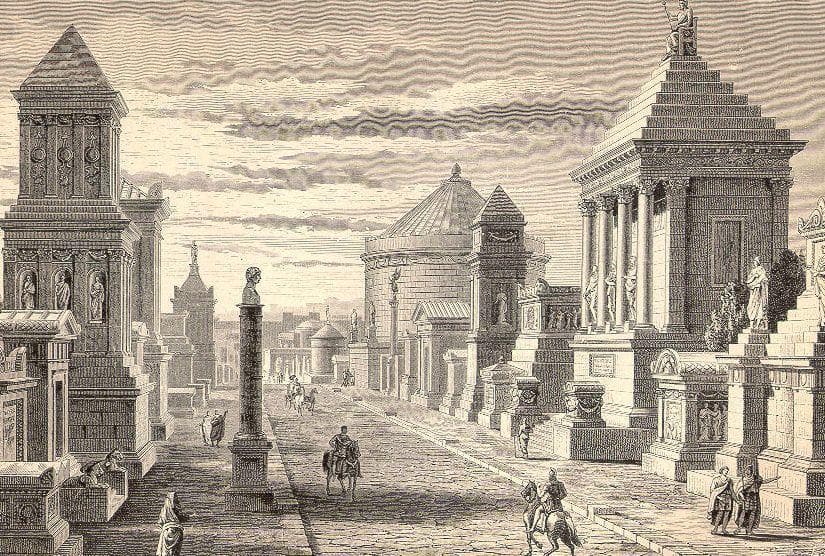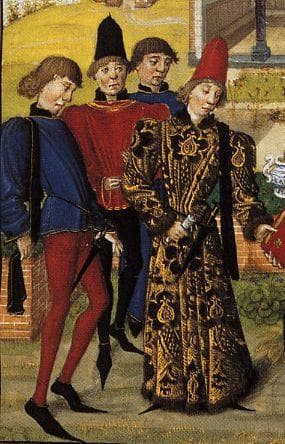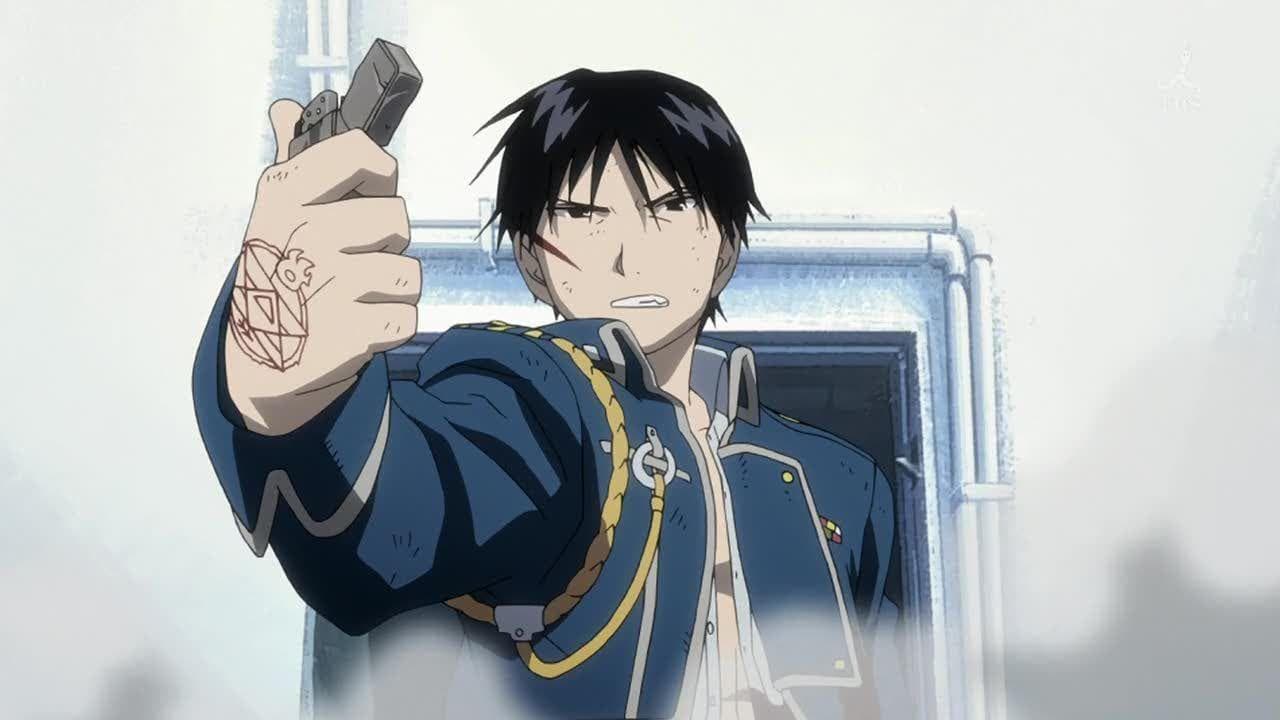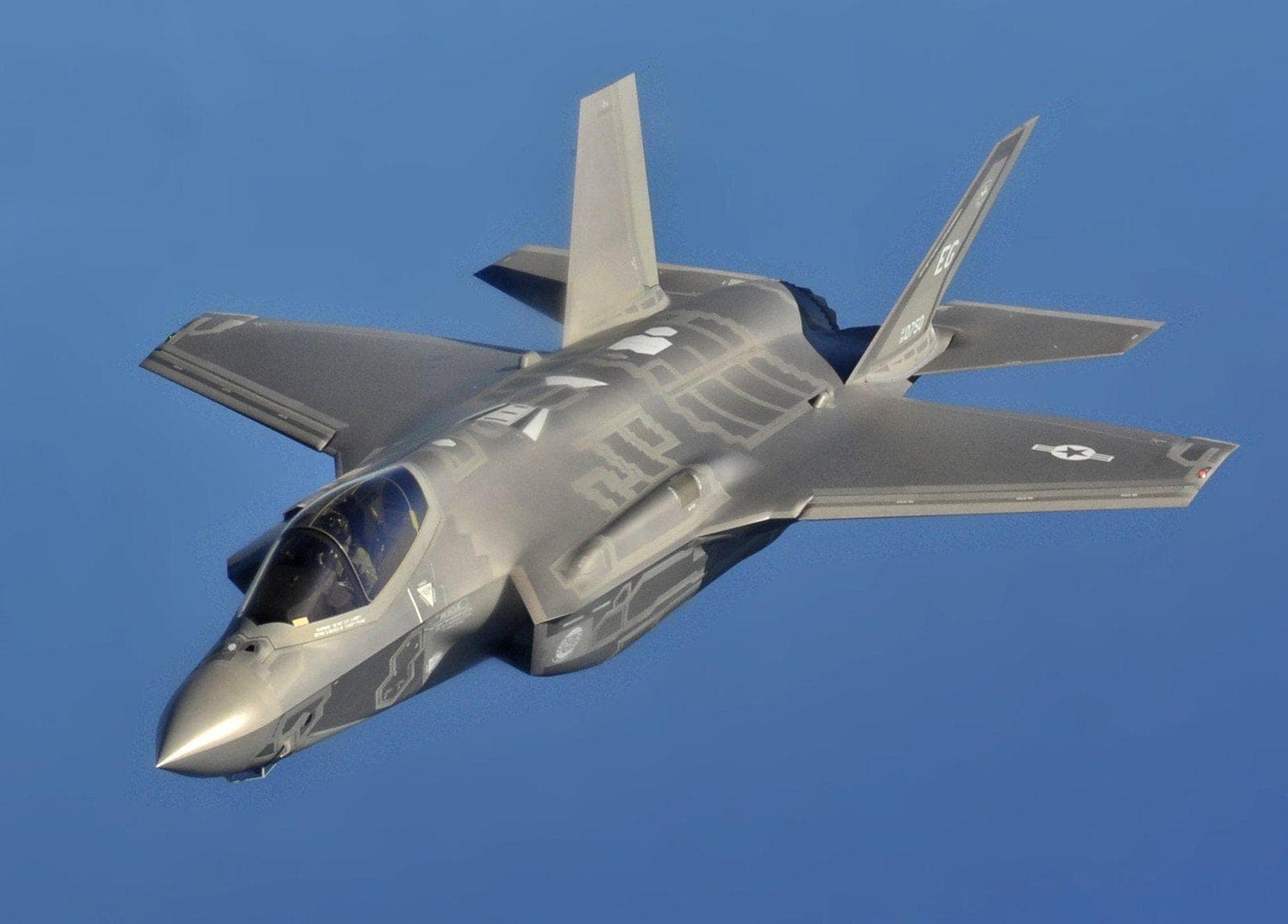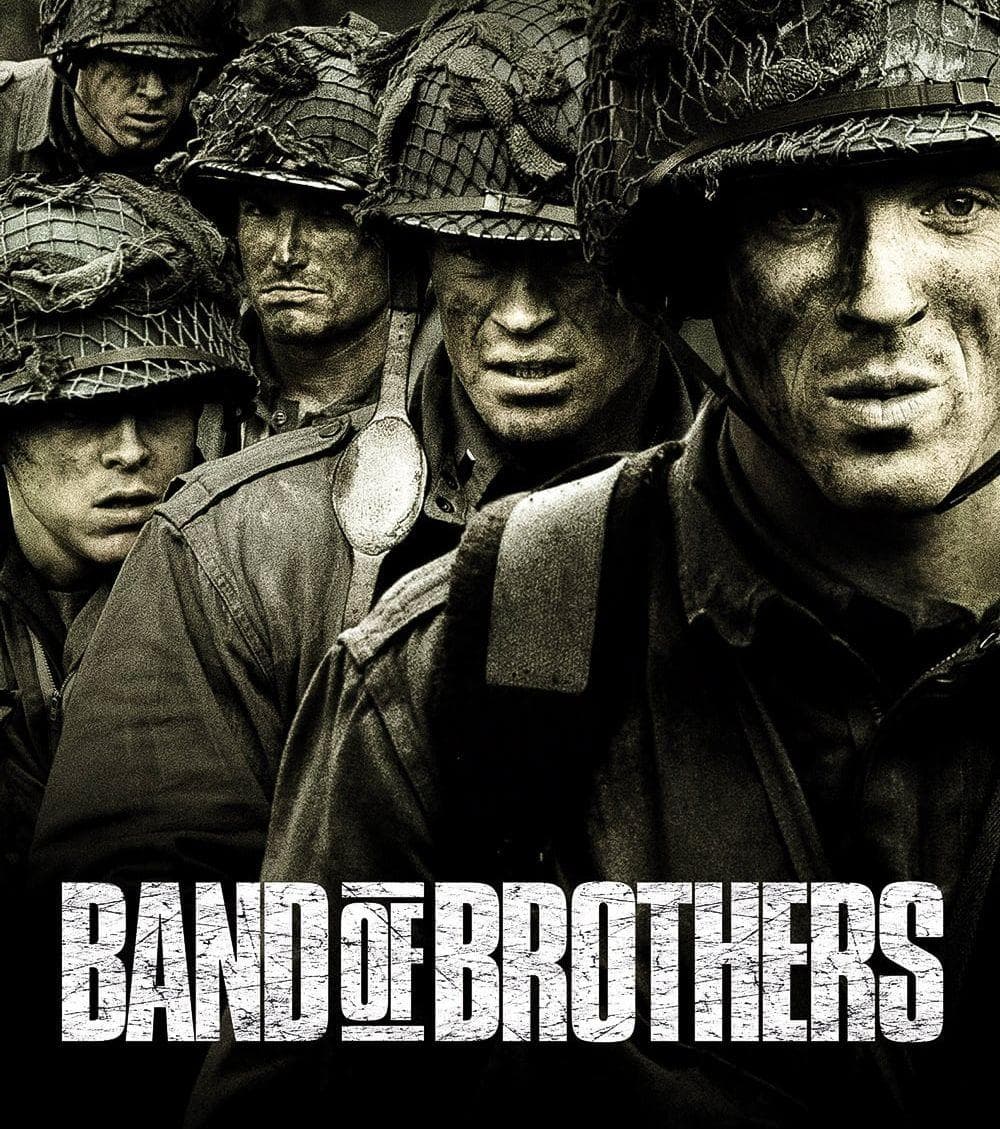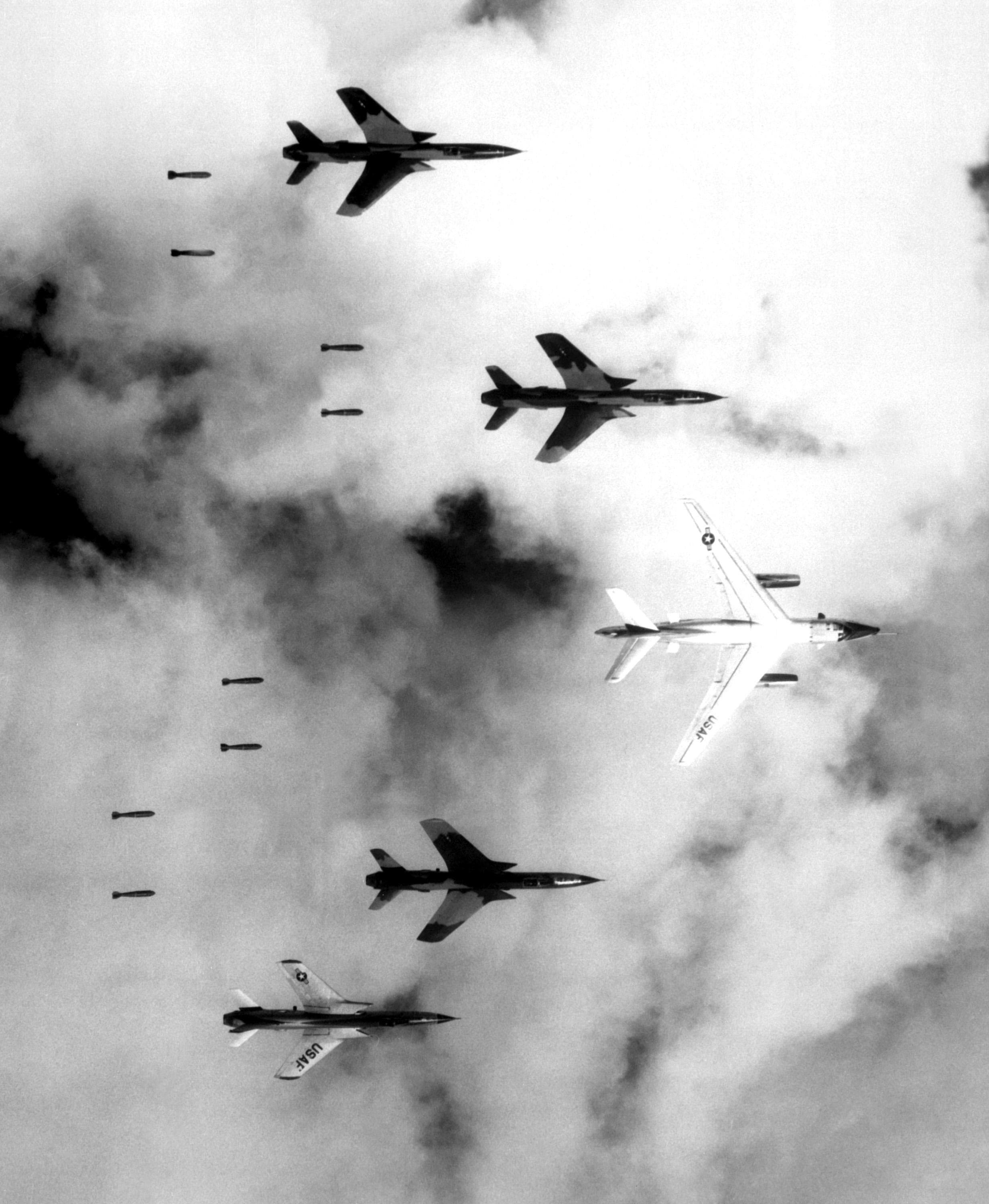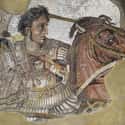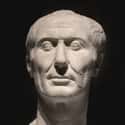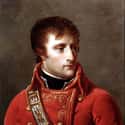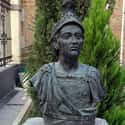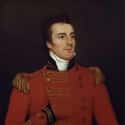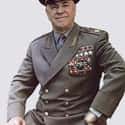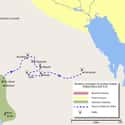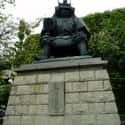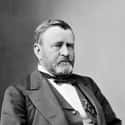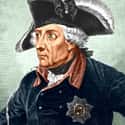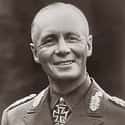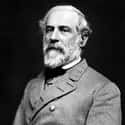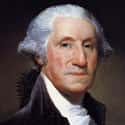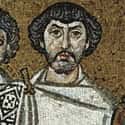-
(#1) Alexander the Great
- Dec. at 33 (355 BC-322 BC)
Where And When: When Alexander the Great was born, in 356 BCE, he had a huge military head start. His father, Philip II, had assembled a great army. However, without Alexander's military genius, it's unlikely even that mighty army would have gone on to conquer an unprecedented amount of territory, creating one of the largest empires of the ancient world.
Win/Loss Ratio: 100% (9 wins, 0 losses)
His Greatest Achievements: Alexander was a prodigious tactician and a great military innovator. One of his most consistent tactics was to arrange his troops in a signature wedge shape, which made it easier to defend the core of the army from archers, and allowed cavalry to sweep out and punch holes in the enemies defenses. That's how he won the Battle of Issus against a much larger Persian force, perhaps his greatest accomplishment.
How He Went Out: To this day, it's unclear what ended Alexander the Great at the age of 32. Some said malaria, others said poison. His armies had already reached into India, and he was planning an invasion of Arabia; who knows what he might have accomplished had he lived. Maybe he would have eventually lost a battle.
-
(#2) Julius Caesar
- Dec. at 56 (99 BC-43 BC)
Where And When: Born in 100 BCE, Julius Caesar rose to the heights of Roman society both through the luck of his birth, and his incredible usefulness as a military commander. He was responsible for the conquest of Gaul and the strengthening of the Roman legions. This, in turn, allowed him to achieve supreme political power and to become the unchecked ruler of the empire he had such a big hand in forging.
Win/Loss Ratio: 93.75% (15 wins, 1 loss)
His Greatest Achievements: The conquest of Gaul, Caesar's greatest military achievement, was made possible through his shrewd use of military engineers. These were specialized groups that could quickly build powerful fortifications, seemingly overnight. This allowed the highly organized Roman army to fight as though fortified, even in wilderness battlefields.
How He Went Out: Politics got the better of Caesar, and he was stabbed in the Roman forum. His military career had ended after he thoroughly defeated the rebellious Pompeiian faction at the Battle of Pharsalus.
-
(#3) Napoleon Bonaparte
- Dec. at 52 (1769-1821)
Where And When: The man who would be known as the "Master of Europe" was born a commoner in 1769. A lifelong military man, he rose through the ranks during the French Revolution and eventually became Emperor of France through a coup. This was the start of an explosive time for France, during which Napoleon's armies crushed the nations of Europe and stretched all the way into Russia, even sending expeditions into Egypt.
Win/Loss Ratio: 88.3% (38 wins, 5 losses - numbers that make him by far the most statistically successful general in world history)
His Greatest Achievements: His military innovations are too many to count here, but Napoleon's genius is synonymous with his success at the Battle of Austerlitz. Taking a huge risk, he ordered his army to retreat from the most defensible ground, giving the impression of fear and disorganization. Overconfident, his enemies pursued him, and they were crushed when Napoleon's hidden Third Corps joined the fray.
How He Went Out: After his famous and crushing defeat at the Battle of Waterloo, Napoleon was forced to abdicate. He entered into exile and perished on the Isle of Saint Helena, possibly from stomach cancer.
-
(#4) Hannibal
- Dec. at 64 (246 BC-182 BC)
Where And When: Hannibal Barca was part of a family of great warriors. Various members of his family commanded the Carthaginian Armies during the Punic Wars with Rome. Indeed, Hannibal was born into these battles in 247 BCE. While the conflict ended with the devastation of Carthage, Hannibal Barca led his troops to stunning success in several engagements with the Romans.
Win/Loss Ratio: 86.7% (13 wins, 2 losses)
His Greatest Achievements: While Hannibal is best known for the stunning logistical feat of crossing the Alps, his greatest military achievement was at the battle of Cannae. The Romans had raised a force of 80,000 troops to Hannibal's 50,000. Rather than relying on conventional military wisdom, Hannibal used his cavalry to encircle the Roman Army, flanking them and crushing the much larger force.
How He Went Out: After being betrayed by an ally, Hannibal was defeated at the battle of Zama. He fled into exile, where he fought for a few smaller kingdoms before eventually taking his own life to avoid extradition to Rome.
-
(#5) Arthur Wellesley, 1st Duke of Wellington
- Dec. at 83 (1769-1852)
Where And When: It might seem unlikely that two of the world's greatest military geniuses would live at the same time, and history should draw them into direct conflict, but that's exactly what happened in the case of Arthur Wellesley and Napoleon. Wellesley was an Irish aristocrat who rose through the ranks of the British military, winning numerous engagements by land and sea, until he came into direct conflict with Napoleon at Waterloo in 1815.
Win/Loss Ratio: 94.12% (16 wins, 1 loss)
His Greatest Achievements: While Wellesley will forever be known for Waterloo, his tactical mind was best on display during the battle of Salamanca. He was evenly matched with his French counterpart, the general Marmont, for weeks. Finally, seeing an opening, Wellesley committed his entire cavalry force to a charge that may have been the most effective single cavalry movement of the Napoleonic Wars. This combination of patience and decisiveness was characteristic of Wellesley.
How He Went Out: Waterloo was the end of Wellesley's military career. Like many successful generals, he transitioned into politics, becoming a powerful conservative voice and, eventually, prime minister.
-
(#6) Georgy Zhukov
- Dec. at 78 (1896-1974)
Where And When: Georgy Zhukov was the Soviet Union's greatest military general, whose successes were all the more remarkable given that the Soviet military was rife with corruption, incompetence, and nepotism. He was responsible for pushing the Japanese out of Mongolia, and stopping the German advance at Leningrad in 1941.
Win/Loss Ratio: 100% (10 wins, 0 losses)
His Greatest Achievements: Zhukov's most stunning victories were defensive, stopping the German army at Leningrad and Moscow. In Moscow particularly, he exhibited his greatest skill: an unparalleled understanding of terrain and troop movement. This careful attention to battlefield mechanics allowed the Soviet Army to hold its own against German superiority of numbers and equipment.
How He Went Out: After WWII, Zhukov was so enormously popular that Stalin viewed him as a threat. He was removed from supreme command and entered politics, where he remained until he was 62. Eventually, he was forced out by Khrushchev, and later on he suffered from a stroke and passed.
-
(#7) Khalid ibn al-Walid
- Dec. at 50 (592-642)
Where And When: Legend says when Khalid was a child, his father fed him small amounts of poison to toughen his constitution. Bad parenting, but it may have worked since Khalid ibn al-Walid grew into one of the greatest generals the world has ever seen. Known as the Sword of Allah, he was a daring and ferocious commander, carving a swath of violence across Central Arabia in the 7th century CE.
Win/Loss Ratio: 92.3% (12 wins, 1 loss)
His Greatest Achievements: Early in his career, Khalid was part of a battle in which all the appointed commanders were wiped out. It threatened to be a rout until Khalid stepped into the power vacuum. He commanded a small cavalry group to ride a distance from the battle and ride around in circles, kicking up dust. This led the enemy to believe reinforcements were coming. Khalid took advantage of their demoralization to stage a ferocious attack which covered his main force's retreat.
How He Went Out: Khalid had always wanted to pass in battle, yet he did not. He lived a life of wealth and political favor and yet on his deathbed, it is reported he said:
I have fought in many battles seeking martyrdom that there is no spot on my body without a wound made from a sword, lance or arrow. Yet now I lay dying on my bed like an old camel. May the eyes of cowards never find joy.
-
(#8) Takeda Shingen
- Dec. at 52 (1521-1573)
Where And When: In the 16th century, Japan was in the midst of the Sengoku, or "Warring States," period. It was a time of bloody military conflict and it produced perhaps the finest warrior Japan has ever known. Takeda Shingen was born into a warrior family and fought with several great houses, his exploits earning him near mythological acclaim. Indeed, many of his battles are dramatized as part of Japanese folklore.
Win/Loss Ratio: 88.24% (15 wins, 2 losses)
His Greatest Achievements: The Battle of Sezawa saw a group of five warlords gather their forces to oppose Shingen. Their forces numbered 12,000, to Shingen's 3,000. Despite this, the lightning-fast cavalry tactics Shingen was known for crushed the warlord's armies, slaying 3,000 of their troops while Shingen lost only 500 men. These kinds of numbers were not uncommon for Shingen, who managed to sustain few casualties even in defeat.
How He Went Out: Like Alexander the Great, Shingen's career was cut short under mysterious circumstances. He was battling with the powerful Tokugawa family when he perished, perhaps as a result of terminal illness, perhaps a slaying.
-
(#9) Ulysses S. Grant
- Dec. at 63 (1822-1885)
Where And When: The commander of the Union forces during the Civil War, Grant had an initially inauspicious career. As a military cadet at West Point, he was unremarkable; it wasn't until the North and South fought that Grant began to distinguish himself, particularly by his capture of Vicksburg. He was then appointed Lieutenant General by Lincoln, and placed in command of all Union armies.
Win/Loss Ratio: 92.3% (12 wins, 1 loss)
His Greatest Achievements: Grant was a peerless wartime administrator, who understood his work in the battles was not only a military operation, but a political one. As a result of this, he engaged in total combat. Typically, battles during this period were fought when seasons permitted. Grant pushed hard to secure better food and equipment for his men so they could fight year-round. This was combined with an utterly relentless pace, which set the Confederate armies back and forced them to be reactive.
How He Went Out: Unfortunately, Grant's reputation as a general was tainted by his political inadequacy after he was no longer a general. He leveraged his status as a hero to a successful run for the presidency. After a widely condemned presidential administration, Grant was eventually bankrupted and perished in debt.
-
(#10) Frederick II of Prussia
- Dec. at 74 (1712-1786)
Where And When: Frederick II of Prussia shattered many norms during his reign from 1740 to 1786. He was an atheist, a homosexual, and a brilliant statesman and general who took the small kingdom of Prussia from anonymity to a dominant position in European politics.
Win/Loss Ratio: 84.62% (11 wins, 2 losses)
His Greatest Achievements: Some of Frederick's tactical genius is retained in his "Military Instructions to Generals," which shows that, above all, Frederick valued subterfuge and subtlety. He writes:
I have no wish to recite here the almost infinite list of stratagems, for they have all the same end in view, which is, to oblige the enemy to make unnecessary marches in favor of our own designs. Our real intentions are to be studiously concealed, and the enemy misled by our affecting plans which we have no wish to execute.
How He Went Out: As he grew older, Frederick grew increasingly isolated and intransigent. He remained in power until the end of his days, having secured a mighty kingdom for the Prussians. It would take the armies of Napoleon to topple the Prussians.
-
(#11) Erwin Rommel
- Dec. at 53 (1891-1944)
Where And When: Born in 1891, the man who would come to be known as the Desert Fox served with distinction during WWI, and was an enthusiastic supporter of the rise of Adolf Hitler in Germany. During WWII, Rommel became a national hero, famed for his lightning-quick tactics, a perfect tactician for the Third Reich ethos of blitzkrieg.
Win/Loss Ratio: 33% (3 wins, 6 losses)
His Greatest Achievements: Undoubtedly, Rommel's greatest tactical achievement was his tank campaign in Northern Africa. A Field Marshall at the time, his decisive use of tanks and his aggressive tactics caught the British in North Africa off guard. This led to the Battle of Gazala, in which Rommel used a wide, sweeping flank attack to overwhelm British tactical command and throw their troops into disarray.
How He Went Out: Rommel's end was political, not military. Increasingly disgusted by Hitler's handling of WWII, Rommel was implicated in an attempted slaying of the Führer. Because he was a hero in combat, he was offered the option of taking his own life in exchange for his family's immunity. He chose that option, and his passing was announced as a heart attack in 1944.
-
(#12) Robert E. Lee
- Dec. at 63 (1807-1870)
Where And When: Robert Edward Lee was born in 1807, the son of a Revolutionary War hero. He was a lifelong military man, serving in the Mexican-American War and as superintendent of West Point. When the Civil War became inevitable, Abraham Lincoln offered Lee command of the Union's forces, but Lee turned him down, unwilling to fight against his fellow southerners.
Win/Loss Ratio: 57.14% (8 wins, 6 losses)
His Greatest Achievements: Lee's greatest single success was at the Battle of Chancellorsville, where Lee used brilliant flanking maneuvers to defeat a much larger Union force. However, Lee's strongest overall quality was his ability to sustain his army through the course of the battles, his wisdom in choosing targets and, above all, his ability to soften inevitable defeats at the hands of larger and better equipped Union armies.
How He Went Out: Lee surrendered to General Ulysses S. Grant at the Appomattox Court House in April 1865. This came after a long campaign during which the much larger Union army hunted and harried Lee's troops, whittling them down. That they lasted so long is a testament to Lee's strategic brilliance.
-
(#13) George Washington
- Dec. at 67 (1732-1799)
Where And When: Born in 1732, George Washington was a farmer and plantation owner by trade. Like many wealthy men, he found a leadership position in the French and Indian War. His experience there made him an obvious candidate to lead the Revolutionary Army when controversy broke out between the colonies and the British.
Win/Loss Ratio: 50% (6 wins, 6 losses)
His Greatest Achievements: On statistics alone, Washington wasn't an impressive general. However, the mere fact that the Revolutionary Army held together through the winter at Valley Forge and against the overwhelming force of the British is due to Washington's tenacity and ability to inspire loyalty. This toughness and charisma allowed the Revolutionary Army to hold on in the face of losses, and eventually to claim a major victory at the Battle of Yorktown.
How He Went Out: Washington's victories in battle turned him into a national hero. He was the first President of the United States, and his statesmanship went a long way toward uniting the fractious colonies and forging a new national identity.
-
(#14) Belisarius
- Dec. at 65 (500-565)
Where And When: After the fall of the Roman Empire, the Byzantine Empire saw the western territories as their rightful property. The Emperor Justinian I particularly wanted those territories back, and the instrument of his plan was the general Belisarius. Born around 500 CE, Belisarius was described by the historian Edward Gibbon as "...daring without rashness, prudent without fear... he was modest and humble in the most prosperous fortune."
Win/Loss Ratio: 80% (4 wins, 1 loss)
His Greatest Achievements: Belisarius was a shrewd commander on the field, but perhaps his greatest skill was in his management of supply lines and army morale. He fought extended campaigns thousands of miles away from friendly territory, with far fewer troops than his opponents. His understanding of the importance of mounted archers was decisive in his victory over his many opponents.
How He Went Out: Legend says Belisarius was blinded and spent his final days as a beggar. There is no historical basis for this. In fact, despite a falling out with Justinian, Belisarius was eventually restored to his position and lived out his final days in the Byzantine court.
New Random Displays Display All By Ranking
About This Tool
In any era, the military is the most important national institution, so military leaders in the ancient world were respected even after their careers were over. The generals of Rome and Greece are regarded pioneers in the syllabus of military academies, and their strategies and military policies are still effective in motivating soldiers and civilian leaders. We can learn more facts about the great warriors of the ancient world through mythology and history books.
The random tool lists 14 great and strong generals who would win in a war between the greatest military leaders in history, such as Alexander the Great, who is considered the greatest military leader in the world because he conquered most of the known world at that time.
Our data comes from Ranker, If you want to participate in the ranking of items displayed on this page, please click here.

